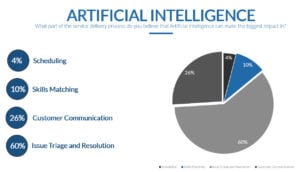How will the Proliferation of Automation in the Workforce Affect the Field Service Business?

Automation continues to proliferate throughout society with the rapid development of robotics, Internet of Things (IoT) and Artificial Intelligence (AI) technologies. Various studies cite the potential for these technologies to eliminate millions of jobs over the next few decades, displacing workers in many industries and market segments such as manufacturing, retail, transportation and many others. So how will the proliferation of automation affect the Field Service business and its workforce? According to a Brookings Institute study titled , Automation and Artificial Intelligence – How Machines are Affecting People and Places, the category of “Maintenance”, which includes a wide array of tasks is listed as a “medium” level of potential for displacement by automation. This means that they estimate a range of 30% – 70% potential displacement of various tasks associated with maintenance through automation.
While the tasks identified by Brookings are wide-ranging, it is clear there are opportunities to automate some aspects of Field Service delivery. In fact, in a recent study, Service Strategies found that the task service executives felt Artificial Intelligence in particular could have the most impact on was remote resolution and issue triage. This was followed by customer communication, skills matching and scheduling in descending order. However, only 14% of respondents in the study said they were currently using any form of AI in the service operation. Additionally, our studies indicate that many companies have been slow to adopt IoT technologies. Companies with large installed bases of legacy systems are finding it difficult to retrofit for IoT and therefore can only take advantage of it as new systems are deployed. Since IoT provides the data stream for remote monitoring and AI capabilities, which can drive predictive maintenance and service capabilities, it has had a limited impact on the field service operations for many vendors. While significant opportunities to streamline services exist, until these companies can get IoT into their field deployed systems they will see limited benefit.

Automation systems themselves require maintenance and service. The proliferation of robotic systems, self-service kiosks and a host of other systems means that field service will remain a necessary function and be less vulnerable to the impact of automation as these systems need to be maintained. While efficiencies can be gained through streamlined problem identification, increased remote resolution and deployment of predictive just-in-time maintenance, hands on repair is not going away anytime soon.
Additionally, human field service personnel have a unique and irreplaceable ability to build relationships with their customers. Many companies espouse the virtues of being trusted advisors to their clients rather than just simply a product vendor. Field service personnel are a key factor in developing the trusted advisor relationship and have the capability to add significant value beyond the repair tasks they perform. Service executives should focus their recruiting, training and development activities on ensuring their teams have the skills to add value and ensure strong customer relationships in an increasingly automated world.
So, in my view the march of automation in the workforce is actually good for Field Service. Field engineers are less vulnerable but will have to adapt their skills. Organizations can realize efficiencies but will see the field staff become more important in maintaining customer relationships. And with an ever-increasing number of devices and systems that require service, hands on field repair will remain a valuable part of the service value chain well into the future.
Leave a Comment